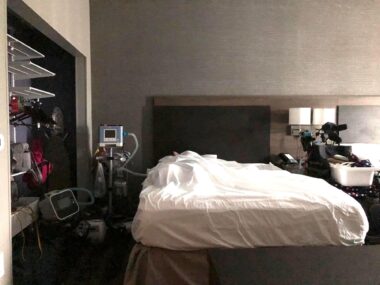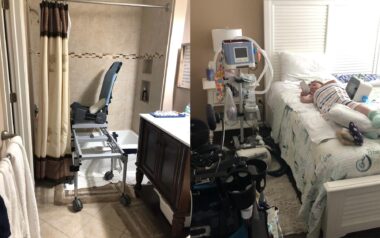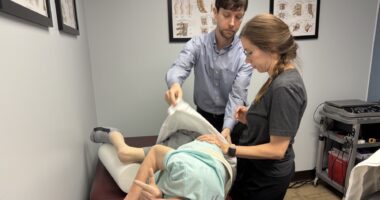How to set the bar higher for accessibility in the travel industry

Who doesn’t love the luxuries and amenities of vacation? Swimming pools, complimentary breakfast, new sights and experiences, and a freshly made bed to return to after a day of relaxation or adventure.
Disabled people and our families also appreciate these comforts, but when you’re vacationing with SMA or another disability, there are a few additional things to consider that determine whether we can partake in — or even access — the amenities of our choosing.
Because our needs are often different than those of our able-bodied peers, we’ll need to do some extra planning and investigating to ensure an enjoyable and accessible trip. Not everything that claims to be accessible actually is. Even basic necessities, such as easy shower access, can be hard to find outside of our normal environment.
In our family, my mom is the resident expert on planning, booking, and orchestrating vacations that integrate fun for everyone with our accessibility needs. That job always takes time and energy, so we appreciate places and people that show initiative in welcoming us and making our journey more accommodating.
Accessibility isn’t one size fits all
Finding a suitable place to stay is one of the most important challenges of traveling with a disability. Although U.S. hotels are required to abide by the regulations set forth by the Americans with Disabilities Act (ADA), these broad requirements don’t always account for individualized accessibility needs.
In a recent column titled “Making a space accessible should involve more than a checklist,” Charcot-Marie-Tooth News columnist Young Lee discusses how short-term vacation rentals also have difficulty creating properties that accommodate such varying needs. He writes that “the word ‘accessible’ is often used to indicate the existence of ramps and a bathroom on the first floor. However, these conveniences don’t necessarily make a place accessible to everyone in the [Charcot-Marie-Tooth] community, much less the wider disability community.”
While Lee considers the possibility of using a checklist to ensure higher levels of accessibility — like the ADA’s requirements for hotels — he concludes that this solution isn’t realistic for every situation and would likely still leave some needs unmet or forgotten.
Going above and beyond creates a welcoming environment
So what can hotels and short-term vacation rentals do to achieve better accessibility? A hotel room where my family stayed for a night en route to our recent vacation destination might offer some clues.
Mom and I were impressed to find that this room included uncommon features, including light switches on the front of the counters, a lowered handheld shower head and controls, and a spacious closet with additional shelves and racks at wheelchair height.

After a day on the road last month, Halsey Blocher and her family rest for the night in an accessible hotel room that exceeded expectations. (Courtesy of Halsey Blocher)
I can’t guarantee that this room would fully meet the unique needs of every disabled traveler, but the attention to detail exceeded our expectations. And that’s the key here: This hotel went above and beyond what was asked of them. The ADA mandates the minimum requirements for accessibility, but there’s nothing that says a business can’t choose to set the bar higher for themselves.
And while details like these may seem small, they send a powerful message to families like mine. That extra thought and effort tell us that our comfort, needs, and happiness are considered as important as everyone else’s, and making us feel welcome is a priority.
What accessibility and hospitality have in common
The travel industry is a part of the larger hospitality industry, and hospitality shares many characteristics with accessibility.
According to a HotelTechReport article, hospitality may have different qualities depending on the situation, but the overarching concept is universal: “It comes down to basic human interactions of being genuine, generous and sincere. When practiced every day, hospitality leads to a deeper sense of connection and belonging with the people around us.”
And like accessibility, hospitality “also isn’t a checklist, something to be completed with detached operational efficiency.” It would appear that both stem from something deeper and more meaningful.

While not advertised as accessible, a short-term rental in North Carolina worked well for Halsey Blocher’s family, and thoughtful details made it a warm and inviting place to stay. (Courtesy of Halsey Blocher)
Although I’m speaking specifically about the hotel and travel industries, this mindset can be applied anywhere, including in our personal lives. Things like architectural modifications and assistive technology may be outward reflections of accessibility, but what they should be reflecting is a caring, thoughtful heart that’s set on including as many people as possible.
I don’t know if the perfect accessible hotel or short-term rental exists yet, but maybe there’s another goal we should be striving for, too. Perhaps if we make intentional, selfless efforts to think of others, we can create spaces that feel welcoming and inclusive for everyone, even if they’re still imperfect. That might be one of the most important steps toward true accessibility that we can all commit to.
Note: SMA News Today is strictly a news and information website about the disease. It does not provide medical advice, diagnosis, or treatment. This content is not intended to be a substitute for professional medical advice, diagnosis, or treatment. Always seek the advice of your physician or other qualified health provider with any questions you may have regarding a medical condition. Never disregard professional medical advice or delay in seeking it because of something you have read on this website. The opinions expressed in this column are not those of SMA News Today or its parent company, BioNews, and are intended to spark discussion about issues pertaining to spinal muscular atrophy.
The post How to set the bar higher for accessibility in the travel industry appeared first on SMA News Today.


